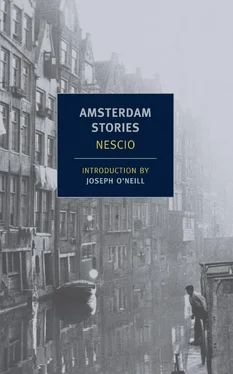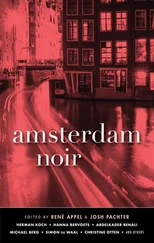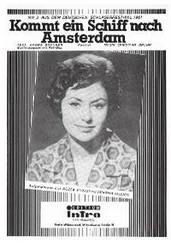“My old man was at his wit’s end. Now he’s hoping that things have improved with time. I’m not so sure. Doesn’t look that way to me. I’m doing just fine. Did you know Bavink just made a pile of money with his latest painting? Ditch at Kortenhoef , with calf and haystack. Look at this.” He took out his wallet. “It’s bulging with cash, Koekebakker my boy, just bulging with cash. Cold hard cash. I’m going on a trip tomorrow.”
“With Bavink?” I asked. “No,” Japi said, “not with Bavink. Alone. I’m going to Friesland.” “In the middle of winter?” Japi nodded. “To do what?” He shrugged his shoulders. “Do? Nothing. All you people are so pathetically sensible: everything needs a reason and a purpose. I’m going to Friesland, not to do anything, not for anything. No reason. Because I feel like it.”
The next day I took him to the station to catch the 7 p.m. express. It was already dark. He was wearing a jacket with the buttons missing, much too big for him, and a hat with a brim that flopped down over his ears, and Appi’s new yellow shoes on his feet. In his hand was a paper cigar holder with an advertisement on it. “Wait a second,” he said, when we were already downstairs. “I forgot something.” He came right back down carrying a fishing pole.
He wasn’t very talkative that evening. I couldn’t get out of him what he was planning to do with the fishing pole. On the way to the station, he smoked four cigars in half an hour with his paper cigar holder, and when I said goodbye to him at the gate he asked if I happened to have a little tobacco for him.
Six weeks later he came back with six buttons on his jacket and a pair of red velvet slippers on his feet. He refused to give any explanations. Where was his fishing pole? Oh, that, he’d dropped it out of the train. One time he’d fallen in the water himself too, he said. Other than that his lips were sealed. He had obviously not had a shave the whole time, he looked the color of red brick and smelled like cow shit. He brought back two pounds of tobacco that no one else could smoke, he was addicted to it and didn’t ask for a cigar for two weeks. Then the two pounds were gone, plus a butt he had brought too. It turned out you couldn’t get that kind of tobacco anywhere in Amsterdam. He wrote to Friesland for some more but didn’t get an answer. He was inconsolable. After a few days, though, I saw him sitting at Bavink’s again with a cigar in his mouth after all, one of Bavink’s of course.
VI
The next summer, Japi disappeared again. Then I ran into him on Boulevard du Nord in Brussels. Monsieur Japi was clean-shaven and nattily dressed in a gray hat, a narrow gold-colored silk tie, checkered shirt, belt, white flannel jacket with thin blue pinstripes, white linen pants with impeccable cuffs, brown and white argyle socks, and flat shoes.
How was it going? Dandy. What was he doing here? Strolling back and forth along the boulevards between Gare du Nord and Gare du Midi. Having a good time? Splendid. Residing? In Uccle. Freeloading upon? He laughed but didn’t answer. We had several glasses of strong beer at the Maastricht pub on Place de Brouckère. He loved the beer there. Actually he drank several pints and I had one pint I didn’t finish. He sat majestically straight in his chair and drank with dignity and great pleasure, held forth on the topics of asphalt, the Grote Markt, and the fine weather, then said he had to go and asked where I was staying. In that case he’d have to come pay me a visit sometime. After saying that, he paid for the beers and left me sitting there in amazement.
He came back to Amsterdam at the beginning of August with a bandaged head. A mine worker in Marchienne-au-Pont had smashed a ceramic pot over his head. He looked more down-and-out than ever. His old man was keeping him on a terribly short leash. He wore his white pants, which hadn’t been white for a long time, deep into November. He was not his old self anymore — he talked less, smoked much less. When he came by Bavink’s place and Bavink put his cigars on the table, he collapsed into a chair, kept his jacket and hat on, picked up a cigar with difficulty, slowly bit the end off, had trouble finding his matches, hesitated before lighting it, smoked it slowly, and rarely had more than one a night. If he did light a second cigar he would throw most of it away, something he never used to do before. He used to smoke a cigar until the end was too small to hold and then stick a pin in it to smoke the rest. Before long it was burning crooked. One time he let Bavink’s stove go out.
We gave up on him.
Then, on a night with a hard frost, between Christmas and New Year’s, Hoyer appeared, after we hadn’t seen him in months. We chatted about this and that for a while and then he asked about Japi. And started to reminisce. Did we remember how last summer (about six months back at that point) he went rowing with us on the Amstel at night — he was supposed to sit in the bow and keep a lookout because the Perseverance was smashing little boats to pieces at the time, it had just sunk a tjalk at the Omval. Japi sat and looked at the reflection of the stars in the water, and held his right hand in the water, and didn’t notice any Perseverance , so that the Perseverance practically had to run aground in the bend to avoid us. They were furious and one of them ran back to the aft deck and chewed us out for being stark raving morons, and threw a stone that plunged into the water in front of our bow. Then Bavink had said he knew something like this would happen and Japi said: “Close one.”
“Apropos of which,” Hoyer suddenly said — Hoyer liked to throw around fancy phrases—“Apropos of which, I saw Japi in Veere with a French lady, a damned fine looker.” All night long the two of them had stood talking together on the stone jetty and looking out over the railing at the lit buoy and the revolving beam of the Schouwen lighthouse, and they’d listened to the waves, and “sucked face,” as Hoyer crudely put it. Bavink said again that he always knew something like that would happen, and I said, “What idiots we are, we should have known,” and then we couldn’t stop talking about Japi and how he wasn’t the freeloader we were used to anymore.
It took another month before Japi surfaced. His old man had found him a job and he was supposed to start on March 1. He didn’t say that he thought it’d be miserable. He would wait and see what he could make of it. He’d be earning fifty guilders a month. That night there was another severe frost. The stars were bright and terrifyingly high. The stove was cold. The three of us sat with our coats on, collars up, hats on, the way we sat so many times when we were tougher than the capitalist spirit and had nothing to heat the stove with.
Then Japi started talking and talking and wouldn’t stop. It was creepy. There you were, he said, hurtling on this earth through the icy blackness of space, where night never ends, the sun had disappeared never to rise again. The earth raced on through the darkness, the icy wind howling behind it. All these heavenly bodies hurtling desolately through space. If one of them hurtles into you then you’re lost, lost with all the other fifteen hundred million unlucky people. Japi sat shivering in his coat, it was freezing in the room.
Then he started in again on a different tack. The sun could be so beautiful, shining in the Waal River. He’d seen the sun shining in the Waal near Zaltbommel the last time he’d ridden the train over the bridge. Between the bridge and the city, the sun made a big patch of light on the water. The water flowed by and the sun just shone on it, a hundred, a thousand, a hundred thousand times. Two thousand years ago the sun was already shining on it and the water was flowing by. God knows how long it’s been. The sun had risen more than 700,000 times since then, it had set more than 700,000 times, and all that time the water was flowing. The math made him feel sick. How many rainy days had there been in all that time? How many nights had it gotten as cold as tonight, or colder? How many people had seen that water flowing by and seen the sun shining in it and seen all the stars on the nights as cold as this? How many people who are dead now? And how many will still see the water flowing in the future? And two thousand years, that’s nothing, the earth has existed for thousands and thousands more years than that and will probably exist for thousands more. The water will probably flow for thousands of years more, without him seeing it. And even if the world did end, that still didn’t really mean anything. There would be so much more time afterwards, time would never end. And all that time, he would be dead.
Читать дальше



![Олеся Проглядова - Nomen nescio. Имя неизвестно [litres]](/books/391740/olesya-proglyadova-nomen-nescio-imya-neizvestno-lit-thumb.webp)








